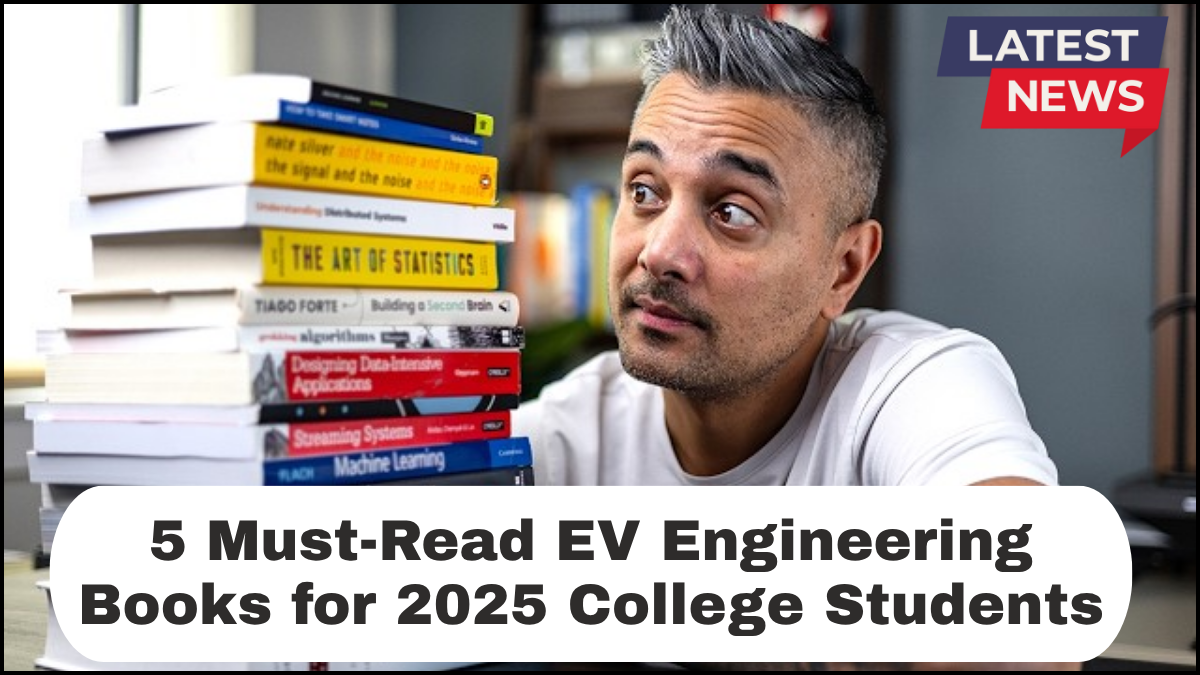Electric Vehicle (EV) technology is evolving at lightning speed. For college students stepping into this field, choosing the right study material is crucial. With universities updating their 2025 syllabus recommended list to keep up with industry advancements, students need top-tier resources that not only cover fundamentals but also explore real-world applications.

Whether you’re specializing in EV systems, battery technology, or electric powertrains, the following EV engineering books for students are essential reads for mastering both theory and practice.
1. “Electric Vehicle Technology Explained” by James Larminie and John Lowry
Why it’s essential:
This is one of the most widely recommended EV engineering books for students and professionals alike. It presents complex technical details in an accessible, easy-to-digest manner, ideal for undergraduates.
What’s inside:
-
In-depth coverage of EV architecture, energy sources, and power electronics.
-
Real-world case studies on leading electric cars.
-
Updated chapters aligned with current global standards.
2025 relevance:
Many institutions have placed this book on their 2025 syllabus recommended list due to its strong theoretical base and practical insights.
2. “Modern Electric Vehicle Technology” by C.C. Chan and K.T. Chau
Why it stands out:
Written by pioneers in EV research, this book bridges academic theory with engineering practice. It’s particularly useful for students focusing on system integration and vehicle design.
What’s inside:
-
Modeling and simulation of electric drives.
-
Discussions on hybrid configurations and fuel cell integration.
-
A forward-looking view on autonomous EVs and smart mobility systems.
Added value for students:
It introduces advanced control strategies, making it a solid pick for senior-year projects or master’s level studies.
3. “Battery Management Systems for Large Lithium Ion Battery Packs” by Davide Andrea
Why it’s critical:
Understanding batteries is non-negotiable in EV engineering. This book focuses entirely on battery management systems (BMS), which are vital for safety and performance.
Key topics covered:
-
Monitoring and balancing lithium-ion battery cells.
-
Thermal management systems.
-
Communication protocols in BMS.
Why students should care:
With EV safety regulations tightening, battery knowledge is now a top priority in the 2025 syllabus recommended list. This book delivers exactly what aspiring engineers need.
4. “Electric Powertrain: Energy Systems, Power Electronics and Drives for Hybrid, Electric and Fuel Cell Vehicles” by John G. Hayes and G. Abas Goodarzi
Why it’s highly recommended:
For those who want to specialize in EV propulsion systems, this book is gold. It provides detailed engineering analysis along with simulation-based problem-solving techniques.
Notable highlights:
-
MATLAB/Simulink examples for real-time simulation.
-
Detailed chapters on inverters, motors, and charging systems.
-
Compatibility with industrial standards and academic syllabi.
Student tip:
It’s also one of the few EV engineering books for students that walks you through designing a complete powertrain from scratch—something many universities emphasize in 2025.
5. “Fundamentals of Electric Drives” by Mohamed A. El-Sharkawi
Why it earns a spot on the list:
Though not EV-specific, this book is foundational. A solid grasp of electric drive systems is essential before diving into EV-specific topics.
What it offers:
-
Principles of electromechanical energy conversion.
-
Motor selection for different drive requirements.
-
Emphasis on DC, induction, and permanent magnet motors—core components in EVs.
Long-term value:
It prepares students for future learning in specialized EV courses and makes it easier to digest more advanced books.
Final Thoughts
As the automotive world shifts toward full electrification, students must stay ahead with the most relevant and rigorous materials. The EV engineering books for students listed above are not only educational staples but also reflect what’s prioritized in the 2025 syllabus recommended list across top institutions. Investing your time in these resources will build a strong foundation in both fundamentals and cutting-edge EV technology.
FAQs
Q1: Are these books suitable for beginners in EV engineering?
Yes. Most of the listed books start with the basics and gradually move into complex topics. They are designed for undergraduate engineering students but are also useful for postgraduates and early researchers.
Q2: Do these books cover practical applications and industry standards?
Absolutely. Each book includes real-world examples, simulation tools, and industry case studies that align with current market trends and technologies.
Q3: Are these books aligned with the 2025 university syllabus for EV engineering?
Yes. These titles appear in many 2025 syllabus recommended lists and are endorsed by academic professionals in electrical, mechanical, and automotive engineering departments.
Q4: Do I need all five books, or can I start with one?
Start with “Electric Vehicle Technology Explained” if you’re new to the subject. As you progress, the others will add depth and specialization based on your interests.
click here to learn more